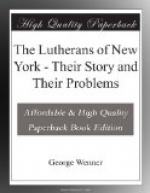It is a different matter, however, when we come to High German, or, properly speaking, New High German, the language of German literature since the sixteenth century, of which Luther, through his version of the Bible, may be called the creator. He at least gave it universal currency. This is a language which we could not lose if we would, and would not if we could.
Scholars are compelled to learn it because it is the indispensable medium for scientific and philosophical study. Formerly Latin was this medium, today it is German.
Lovers of literature learn it because it is the language of Goethe and Schiller, the particular stars of a galaxy that for the modern world at least outshines the productions of the ancient classics. Lutherans enshrine it in their inmost souls because it is the receptacle of treasures of meditation and devotion with which their forms of worship have been enriched for four hundred years. To ignore Angelus Silesius, Paul Gerhardt, Albert Knapp, Philip Spitta and their glorious compeers, would be to silence a choir that sang the praises of the Lord “in notes almost divine.”
We need the literature in which the ideas of our church have for centuries been expressed. Language is the medium of ideas. The thirty denominations that constitute the bulk of Protestantism in this country derive the spirit of their church life for the most part from non-Lutheran sources through the medium of English literature. This is as it should be. But when Lutherans no longer understand the language of their fathers or the literature in which the ideas of their confession have found their fullest expression, they lose an indispensable condition of intellectual and spiritual growth. They can never understand as they should the spirit of the church to which they belong. They are doomed sooner or later to share the fate of the Lutherans of New York of the eighteenth century.
When we have forgotten our German we shall be out of touch with the Lutherans who come to us from the Fatherland. For the time being the World War has put an end to German immigration, but this will not last forever. Some time certainly immigration will be resumed, and as in former periods will be an unfailing source of supply for the Lutheran churches of New York.
In the nineteenth century the “Americanized” Lutherans did not understand the Germans who came over in such overwhelming numbers, and were unprepared to shepherd them in Lutheran folds. The work had to be done by immigrant pastors who, on their part, did not understand the American life well enough to accomplish the best results. For the sake of the Lutherans who come to us from foreign lands we cannot afford to lose touch with the historical languages of their churches.




